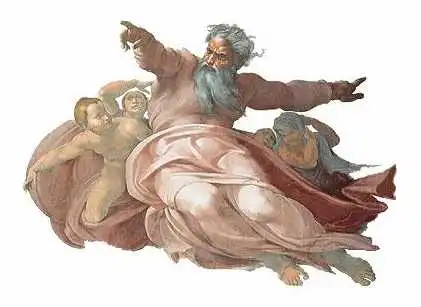God Is Retreating Speculations by Stefan Stenudd
I'm talking mainly about the monotheistic god who is supposed to have created the world out of nothing and continues to watch over it, even to steer everything in it minutely. Other so called religions have a much more complicated or vague relation to reality as we experience it. Up until the end of the Middle Ages, a creator god was as reasonable an explanation as any to be found. Considering what little people knew about the world's nature, maybe it was even the most convincing explanation. Not so before the emergence of Christianity, though. The Greek philosophers and many other thinkers had lots of other ideas about cosmology and the nature of existence, where the gods were often quite peripheral (I've written about that here: Cosmos of the Ancients). But when monotheism took over in Europe, much of the previous philosophy got lost for a thousand years. God as the only primary cause became the law, enforced by the power of the church as well as that of the worldly government. Any cosmology had to start with God uttering Let there be! And it made sense, because there was no clear alternative that seemed more plausible. In the world impregnated by Christianity, the all-powerful god made some kind of sense and presented answers to the questions asked in that setting. But in the late Middle Ages, the texts and thoughts of the Greek philosophers reemerged and spread over Europe. They inspired new questions about reality and a growing questioning of the Christian explanation of the world. People started to think outside of the Christian paradigm. What was the first to be questioned, although the most distant from human everyday life, was the Christian perception of the cosmos: the geocentric perspective, with the earth at the center and the rest of the universe moving around it. This had been supported by most Greek philosophers as well, but not all of them. And the Greeks had tried to explain how such celestial movements as can be seen in the sky could be natural, of themselves instead of constantly controlled by a god. Astronomers dared to calculate anew on the movements of the planets, searching for other models than the one Christianity made necessary. Copernicus (1473-1543) was the first to describe a heliocentric perspective, where the sun instead of the earth was at the center. His idea took quite a while to get widely accepted. The consequence to Christian religion was tremendous, maybe more so than any later scientific revelation. A god who had created the whole world out of nothing as a kind of playing ground for his own image, mankind why would he not have made their place the very center of the universe? Was that god to be understood merely as a local god, bound to our planet? Or a very distant god, who created so many things that earth was peripheral? When Isaac Newton (1642-1727) could calculate the movements of the planets by celestial mechanics, the need disappeared for a god to manually control the orbits of the heavenly bodies, including earth. The universe moved by itself, according to its own laws. God was degraded from the active doer to little more than a clockmaker, winding up a mechanical clock at the dawn of time and then just letting it tick forever, without the need of any additional divine interference. Still, there was mankind, the species that God was said to have created in his own image. Nobody could deny that this species stood out from the rest of the world's creatures in a most magnificent way. Although the cosmos moved like clockwork, in little need of divine assistance, surely mankind was its goal and reason, and the proof of a divine task? Then came Charles Darwin (1809-1882). His theory of evolution introduced the revelation that mankind has not been the same through the ages, but evolved from creatures quite different from our present form. That would be a strange roundabout way for an omnipotent god to create his people. The continued discoveries in evolution showed another clockwork, from the formation of self-reproducing molecules with increasing complexity, to single cell organisms and then multiple-cell organisms, which continued to evolve into the fauna we find today and still keeps evolving. This explanation didn't even need a clockmaker, since what we call life could appear spontaneously in the chemical melting-pot that was the earth already four billion years ago. So, what was the goal of the whole of God's creation, proved to be quite possible without him. For mankind to appear, he didn't need to do a thing. Not much was left for him. Really just one thing: the role of the clockmaker, the one making the universal clock and winding it up at the dawn of time. But in the 20th century, the expansion of the universe was discovered and led to the big bang theory. The emergence of the universe, 13,7 billion years ago, was in no need of a creator god. Nor was the development of galaxies, stars, and planets. What had been the ultimate doing of a monotheistic creator god, making the universe emerge, was revealed as the consequences of natural causes, physical laws and not even those were decided by a divinity. They simply appeared in the first moment of the big bang expansion, and could have been completely different, creating an entirely different universe. Not even the universe was unique. At this point God is all but retired. He's hiding in the possibility of having been the initiator of the big bang, much like a parallel universe could be. Like the very first moment of the big bang, he has been reduced to kind of a singularity. The only role for him, not already taken over by other actors, is that of the initiator of the initiation of the big bang. Until we find the most plausible natural explanation for the appearance of the singularity out of which the universe emerged, a creator god is allowed to hide behind it, maybe (but not likely) responsible for nothing more than causing the initial singularity. He was not even to decide what natural laws were to govern the universe, since those took shape within the first few moments of the big bang. God has become a singularity, a possible, though insufficient, answer to one remaining question our probing minds now focus on. Either he will do like the universe and expand from that singularity, finding some kind of role of vast consequences in the intricacies of reality at the grand scale or he does the opposite, and poof, vanishes completely.
Stefan Stenudd August 21, 2012
More Speculations
About CookiesMy Other WebsitesCREATION MYTHSMyths in general and myths of creation in particular.
TAOISMThe wisdom of Taoism and the Tao Te Ching, its ancient source.
LIFE ENERGYAn encyclopedia of life energy concepts around the world.
QI ENERGY EXERCISESQi (also spelled chi or ki) explained, with exercises to increase it.
I CHINGThe ancient Chinese system of divination and free online reading.
TAROTTarot card meanings in divination and a free online spread.
ASTROLOGYThe complete horoscope chart and how to read it.
MY AMAZON PAGE
MY YOUTUBE AIKIDO
MY YOUTUBE ART
MY FACEBOOK
MY INSTAGRAM
STENUDD PΕ SVENSKA
|
 Sunday Brunch with the World Maker
Sunday Brunch with the World Maker